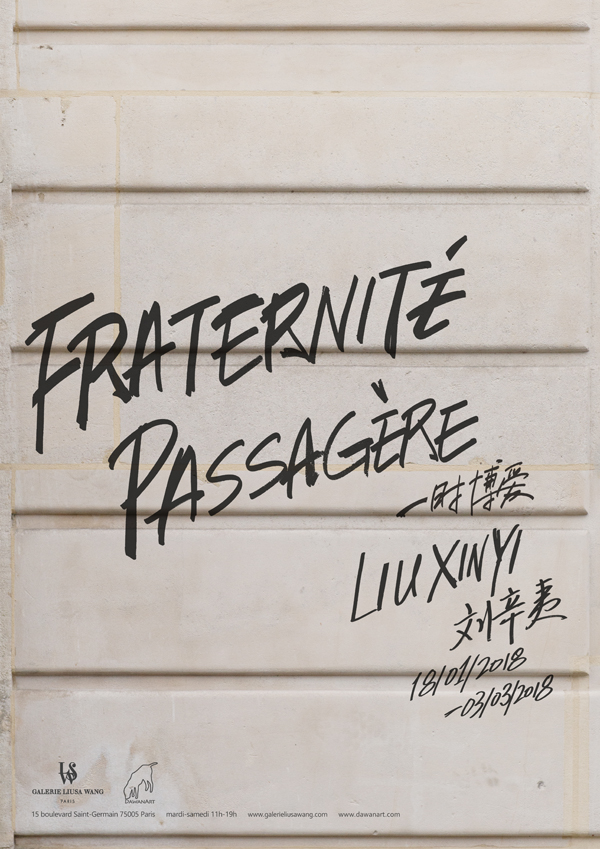2018年1月18日 - 3月3日 / Jan 18, 2018 - Mar 3
Galerie Liusa Wang
& Espace DawanArt, 巴黎 / Galerie Liusa Wang
& Espace DawanArt, Paris

项目自述 / Artist text:
驻留期间,我感受最深的是自身与北京和巴黎的双重距离。因不识法语也不太熟悉法国文化,我只能间接通过英语和中文来获取生活信息和社会信息,因而在认知许多周遭事物时,时常需要借助模糊的猜测。另一方面,在欧洲阅读中文互联网上有关北京的信息,也让我察觉到活跃的网络话语和社群模式对真实的中国社会境况和人际关系的遮蔽。这些距离感和不确定感,促使我在国内生活多年后,再一次将自知有限的主观感知看作相对可以信赖的频道,试图去领会个体与个体,人群与城市的关系基础。
项目的研究起始于我对如何在今天的历史时空中理解所谓“共和”的自问。这一疑问产生于我对大碗驻留公寓所临近的巴黎地标“共和广场”的实地情境与想象的对照。作为一处有历史意味的社会活动场地,冬天的共和广场有着复杂的气场和出人意料的平静,除了小规模的集会和商业活动搭建的帐篷,广场的动态更多地来自到此乘坐地铁通勤的市民,运动少年和游客。这种体验让我意识到现代政治的基础和目标很可能都是汇聚众人,无论他们在经济阶层,文化背景和政治理念上有着多大的不同,自愿以不同的理由聚集一城,在共同生活中设想和参与公共事务。
诚然,目力所及的平和景象恐怕并不代表今天的法国在一个陌生人社会中所践行的“共和”理念已无隐忧,更不用说我所关心的另一个共和国的首都。这种不安感促使我反复体会街道上最为寻常的事物,从而留意到在人群密集的城市空间所离不开的两项配套性的基础元件,一是实物性的公共设施,二为非实物性的理念认同(对二者的考察被分别置于画廊和驻留公寓两个空间展示)。这两者的存在都超越阶层,文化和时代的政治,如不可见的代码,更为长期地定义了现代大城市生活的规则和面貌。关于公共设施的部分,我关注的对象大多来自城市的人行通道;有关理念认同的部分,我希望重点关注“人与人应适当保有间距”这一概念。我计划结合在驻留项目所提供的两个场地的空间特点,基于对这两种”基础元件”的研究,通过观念性的装置实践,推进巴黎留给我的问题。
项目标题“一时博爱”,一是源于自嘲,我常常在工作中关心广泛的涉及社会政治议题的对象,比如特定人群和诸多城市公共设施,但不曾意识到自己的处境也是匆匆过客。二是我注意到当代社会有许多超越私利,关切他者的意愿和行动是非常态的产物,需由理性和规则之外的人类激情去促成。无论是否真的有助于改善情况,城市居民还是可以在行动性的社会参与中临时性地拉近彼此平日里默认的间距,共同想象“共和”与之未来。
—
The residency program maps clearly the distances between me and Paris, in relation to that newly formed distance between me and Beijing. I do not speak French, and am not familiar with the French culture, so I could only obtain daily and social information indirectly in English and Chinese. Therefore, I had to guess a lot when it came to comprehending the immediate surrounding. On the other hand, receiving feeds online about Beijing in Europe made me realise the ways in which heated internet discourses and online community activities effectively obscure the true social conditions and relationships in China. Although I have lived in China for years, the sense of distance and uncertainty left me only with my limited subjective ideas and perceptions as a reliable channel through which I can attempt to comprehend anew the foundation of relationships between individuals, and those between communities and cities.
The research departed from my questioning of the so-called ‘république’, and the understanding of such notion today. This question stemmed from the contrast between the Place de la République near the Espace DawanArt (where I carried out the residency program) as it was, and my imagination of it. As a historical site of social gathering, the Place in the Winter commands a complicated atmosphere and a surprising tranquility. Apart from small-scale gatherings and tents for commercial activities, the dynamics in the square were mostly subway commutes, skateboardings and tourism. I realised that the foundation and goal of modern politics may well be the gathering of the public: however different they are in terms of financial statuses, cultural backgrounds and political beliefs, they are for various reasons to willingly come together, to conceive and participate in public matters in a shared life.
True, the peaceful scene I saw could not testify that the idea of the ‘république’ that France practises today in a society of strangers is perfectly secured, let alone the capital of another republic I am concerned with. This uncertainty asked me to repeatedly experience the most mundane things on the street, and by extension the two most fundamental units that come hand-in-hand in a crowded urban space: physical public infrastructures, and the intangible ideas of identification (the study of the two was exhibited in both the gallery and the apartment). The presence of the two goes beyond class, culture and contemporary politics; as invisible codes, these define the rules and faces of a modern metropolitan life in the long run. For the former, I paid great attention to things and activities found on pedestrian paths; for the latter, I wished to focus on the concept of ‘a distance should be kept between individuals’. I plan to combine the different spatial natures of the gallery and the apartment, further study the two infrastructural units, and further develop the question Paris left me through conceptual installation practises.
The title of the project Fraternité Passagère firstly teases myself; working as an artist, I often am concerned with subjects that are involved in grand socio-political agendas and issues, without being aware that I am merely one of those passengers as well. Secondly, I recognise that many charitable ideas and actions are exceptional products of the society, and can only be motivated by human passions that are not regulated by reasons and laws. Whether they can truly improve the condition or not, city dwellers in activist and social movements may indeed suspend the distance between each other, and imagine together the ‘république’ and its future.
1.jpg)
项目现场一 / Project Venue No.1: Galerie Liusa Wang,2018
2.jpg)
4.jpg)
5.jpg)
6.jpg)
20.jpg)
19.jpg)
22.jpg)
21.jpg)
8.jpg)
7.jpg)
10.jpg)
23.jpg)
12.jpg)
17.jpg)
13.jpg)
15.jpg)
16.jpg)
项目现场二 / Project Venue No.2: Espace DawanArt, Paris, 2018
16.jpg)
3.jpg)
6.jpg)
15.jpg)
8.jpg)
9.jpg)
14.jpg)
17.jpg)
11.jpg)